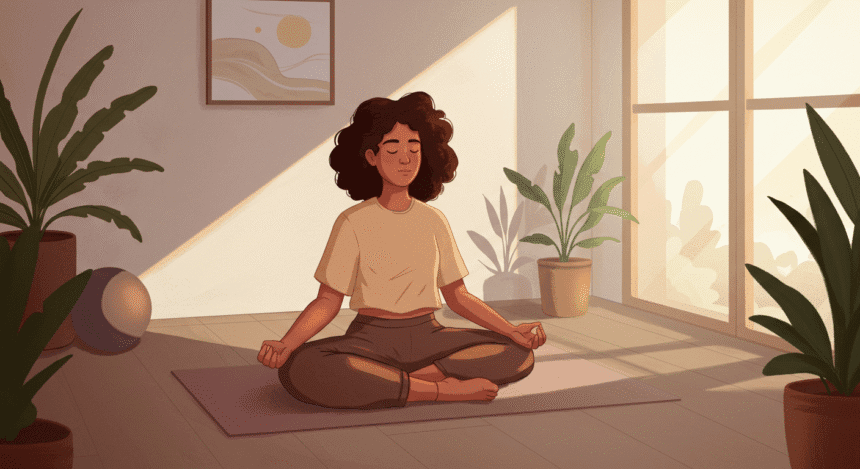A 2015 study by Marc-Antoine Crocq explored the historical roots of anxiety and showed that it has long been observed as a distinct emotional experience. His research suggests that anxiety is not just a modern concept but has appeared in many different eras and societies. Ancient cultures described symptoms that closely resemble what we now recognize in clinical settings. This longer view of anxiety gives context to how people across centuries have tried to cope with intense worry and fear.
- What Causes Stress and Anxiety?
- How Can Lifestyle Changes Make a Difference?
- Can Mindfulness and Breathing Help?
- What Role Does Therapy Play in Reducing Anxiety?
- When Should You Consider Professional Help?
- How Important Is Social Connection?
- What Self-Care Techniques Really Work?
- Can Long-Term Change Really Happen?
The same study points out that early philosophers and healers often approached anxiety through a combination of rational thought and behavioral change. These ideas resemble many of the core practices used today in cognitive strategies. It shows that although medical terms have evolved, the emotional struggle with fear and unease has remained consistent.
“It has often been written that the history of anxiety disorders is recent. It has been repeated that anxiety; like schizophrenia, was hardly known as an illness before the 19th century. In contrast, mood disorders, with melancholia foremost, can boast historical roots going back to classical antiquity. However, it may not be quite true that anxiety is a relatively recent construct. There are indications that anxiety was clearly identified as a distinct negative affect and as a separate disorder by Greco-Roman philosophers and physicians. In addition, ancient philosophy suggested treatments for anxiety that are not too far removed from today’s cognitive approaches.”
Stress and anxiety can be managed and reduced through practical strategies that support emotional balance, self-awareness and mental resilience. According to the World Health Organization, more than 1 in 8 people globally live with a mental health condition, with anxiety disorders being the most common. While occasional stress is part of life, ongoing anxiety can interfere with sleep, relationships, work and overall wellbeing.
What Causes Stress and Anxiety?
Stress typically shows up in response to something external, like a deadline or argument. Anxiety, on the other hand, often feels like a persistent worry that lingers even when no immediate threat is present.
Genetics, personality, past trauma and habits like poor sleep or a nutrient-deficient diet can all contribute. Understanding where stress or anxiety begins in your life can help shape ways to manage them. Social Anxiety Disorder, for example, was first formally described in the 1968 edition of the DSM (DSM-II), showing how long such conditions have been recognized.
How Can Lifestyle Changes Make a Difference?
Small decisions made daily can shape how we feel mentally. Moving your body regularly—even something as simple as walking 30 minutes five times a week—can lift your mood and help with anxious thoughts.
Eating habits matter, too. Choosing less caffeine and processed sugar, while focusing on whole foods, can support steadier emotions.
Sleep is another major piece of the puzzle. Long-term lack of sleep can make anxiety worse and push the body into a near-constant stress state. Creating a nighttime wind-down routine, putting the phone away an hour before bed, and keeping sleep/wake times consistent may help calm the nervous system.
Can Mindfulness and Breathing Help?
Mindfulness can help ease anxiety in ways that are practical and grounded. It teaches people to observe their thoughts without automatically reacting to them. This shift in awareness helps reduce the mental habits that feed anxiety.
Breathing exercises also help. Even a few minutes of slow, deep breathing can slow your heart rate and settle scattered thoughts. Techniques like progressive muscle relaxation can train your body to come out of its fight-or-flight mode. With so many free apps and videos available, anyone can try these exercises—even if they’re just starting out.
What Role Does Therapy Play in Reducing Anxiety?
Therapy can help people identify patterns that might otherwise go unnoticed. This can be especially helpful when anxiety is intense or long-lasting. Cognitive Behavioural Therapy (CBT) is one approach that’s widely used. It gives people tools to challenge negative thinking and change the way they respond to stressful situations.
Over 60% of individuals who complete CBT report significant improvement in symptoms. For those who tend to overthink or spiral, therapy helps address the core beliefs that keep those loops going. Kristin Mitchell of WebMD offers this helpful perspective:
“Anxiety is a normal emotion. It’s your brain’s way of reacting to stress and alerting you of potential danger ahead. Everyone feels anxious now and then. For example, you may worry when faced with a problem at work, before taking a test, or before making an important decision. Occasional anxiety is OK. But anxiety disorders are different. They’re a group of mental illnesses that cause constant and overwhelming anxiety and fear. Too much anxiety can make you avoid work, school, family get-togethers, and other social situations that might trigger or worsen your symptoms.”
In some cases, therapists may bring in other approaches like EMDR or Acceptance and Commitment Therapy (ACT), depending on a person’s experience and history.
When Should You Consider Professional Help?
If anxiety starts interfering with work, relationships or your ability to function, reaching out to a therapist can be helpful. Struggling with constant worry, trouble sleeping, panic attacks or irritability are signs that you’re dealing with more than everyday stress.
Therapists can support people dealing with specific types of anxiety, including social anxiety, phobias, health anxiety and anxiety disorders. The earlier you address these symptoms, the more likely it is that things will improve over time.
How Important Is Social Connection?
Having people you can turn to matters more than many realize. Being alone too often tends to make anxiety feel worse. On the other hand, a phone call, shared meal, or even a quick chat with someone you trust can help lighten emotional weight.
Supportive relationships also release oxytocin, a hormone tied to calmness and bonding. That chemical reaction is part of why just being around someone who listens can help the body feel safer.
What Self-Care Techniques Really Work?
Self-care isn’t just about bubble baths or candles. It’s about tending to what your body and mind actually need. That might mean protecting your free time, turning down tasks that drain you, or making space for something you enjoy.
Writing in a journal can help get worries out of your head and onto paper. Once those thoughts are external, they often seem less overwhelming—and sometimes you even spot solutions you hadn’t seen before.
Other helpful habits include stepping away from distressing news, walking outside, and keeping a gratitude list. Even small things—like enjoying a cup of tea without distraction—can add calm to your day.
Can Long-Term Change Really Happen?
Yes. When people consistently apply small changes, learn new skills, and get the right support, anxiety becomes easier to manage. Through therapy, better habits or mindfulness, it’s possible to face life’s ups and downs without feeling consumed by them.
Stress and anxiety don’t need to run the show. With consistent effort, most people find they can feel more grounded, better connected and calmer—no matter what’s going on around them.









